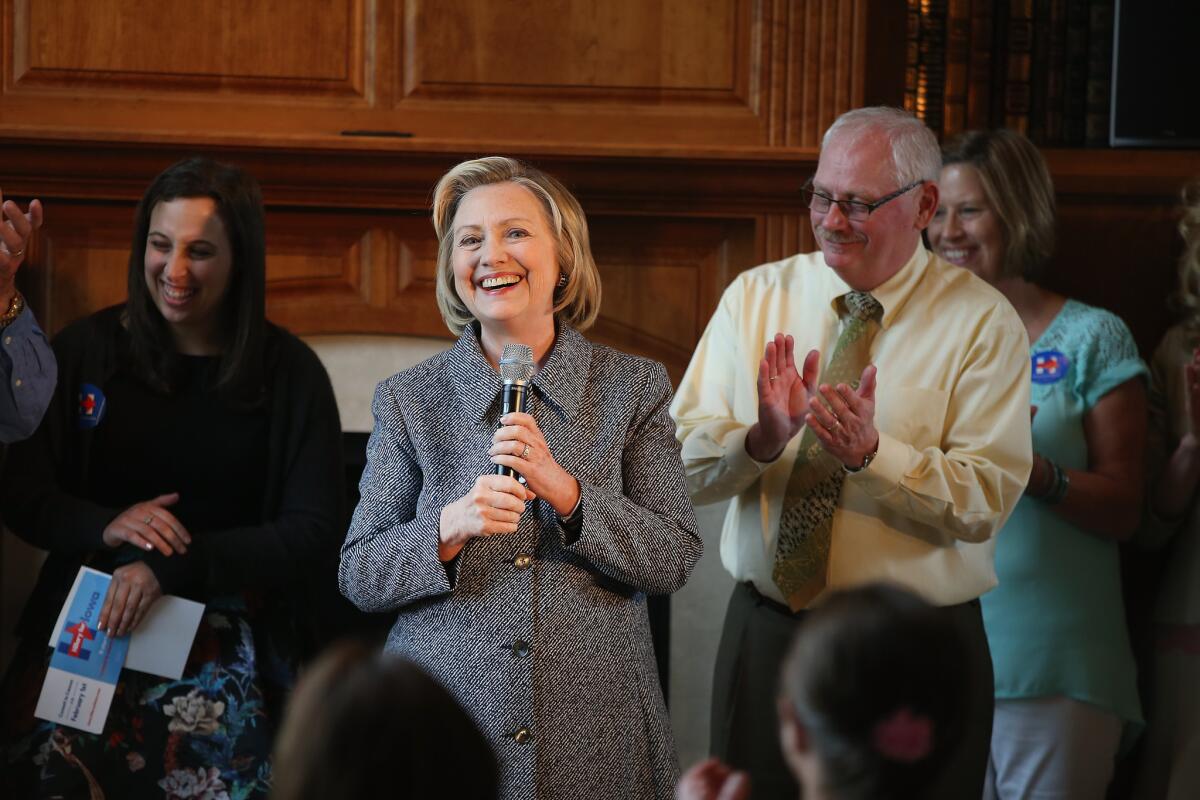Questions about Hillary Clinton emails won’t go away; ‘I want those emails out,’ she says

Democratic presidential front-runner
- Share via
Reporting from Washington — The debate over Hillary Rodham Clinton’s use of a private email account while secretary of State, which has dogged her presidential campaign for more than two months, shows no sign of going away.
In a court filing Monday, State Department officials said they hoped to be able to publicly release the roughly 55,000 pages of Clinton’s emails by mid-January. Clinton has asked the department to release the documents.
That timing could put the release just before the Iowa caucuses, the kickoff of the 2016 primary voting. Although Clinton so far does not face any formidable opponents in the primaries, the emails could introduce an unpredictable element to the campaign -- something candidates seldom like -- and could affect the Republican race as well, by keeping attention focused on Clinton’s tenure as the nation’s chief diplomat.
Tuesday morning, a federal judge who is presiding over a Freedom of Information Act lawsuit regarding the emails, said he planned to order the department to speed up the process by conducting a “rolling” release of the documents, according to Politico, which first reported the court filing. The judge gave government lawyers a week to come up with a new plan.
Either way, the timing itself was no surprise. Department spokespersons repeatedly have said that processing the emails would take “several” months, and officials had indicated that meant the full release probably would not come until the end of 2015 at best.
Clinton herself urged that the emails be made public sooner rather than later.
“Nobody has a bigger interest in getting them released than I do,” she told reporters Tuesday after a campaign stop in Cedar Falls, Iowa, indicating the obvious: The earlier they are published, the more distance she can put between any resulting negative press and Election Day.
Before being released, the emails must be reviewed by State Department officials as well as other agencies to ensure they don’t include classified or other sensitive information. The officials doing the reviews have other work as well. The State Department, for example, has among the worst records in the government for timely release of documents requested under the Freedom of Information law.
Even a much smaller batch of some 300 emails that the State Department has given to the House committee investigating the assault in 2012 on the U.S. diplomatic compound in Benghazi, Libya, has proved difficult. Officials have said for several weeks that those documents would be publicly released “soon,” but they remain stuck in the review process.
But the attention attracted by discussion of the release schedule served as a reminder of how easily the email controversy can overshadow the rest of Clinton’s campaign.
Monday, for example, Clinton told supporters in Iowa that if elected, she would pick Supreme Court nominees with an eye toward overturning the high court’s Citizens United decision, which allowed corporations and other groups to spend unlimited sums on political campaigns.
Publicly promising such an explicit test for nominees -- and on the high-profile issue of campaign spending by big-money interests -- might normally attract a lot of attention. Whether litmus tests for the court are proper and whether Citizens United should be reversed are both controversial topics.
But Clinton’s remarks were largely overshadowed by the renewed discussion of her emails. The fact that setting a date for release could attract such attention indicates how much the actual documents could continue to affect the campaign in the months to come, right on to the actual balloting.
More to Read
Get the L.A. Times Politics newsletter
Deeply reported insights into legislation, politics and policy from Sacramento, Washington and beyond. In your inbox twice per week.
You may occasionally receive promotional content from the Los Angeles Times.











